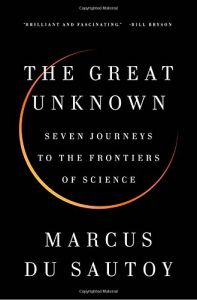Join getAbstract to access the summary!

Join getAbstract to access the summary!
Marcus du Sautoy
The Great Unknown
Seven Journeys to the Frontiers of Science
Viking, 2017
What's inside?
Science helps unveil the mysteries of the universe, but human ignorance remains vast.
Recommendation
In less than a century, telescopes have detected remote galaxies, physicists have explored the most fundamental features of matter, biologists have mapped DNA and mathematicians have solved complex riddles. Even so, what people don’t know vastly exceeds what they do, and that gap fuels science. Professor of mathematics at Oxford University Marcus du Sautoy offers elegant and detailed accounts of great advances in human knowledge, and ponders whether some enigmas must remain forever mysterious.
Summary
About the Author
Marcus du Sautoy holds Oxford University’s Simonyi Professorship Chair for the Public Understanding of Science. He is a mathematician, author, and popularizer of science and mathematics, and received Title of Distinction of Professor of Mathematics at Oxford in 1996.
















Comment on this summary